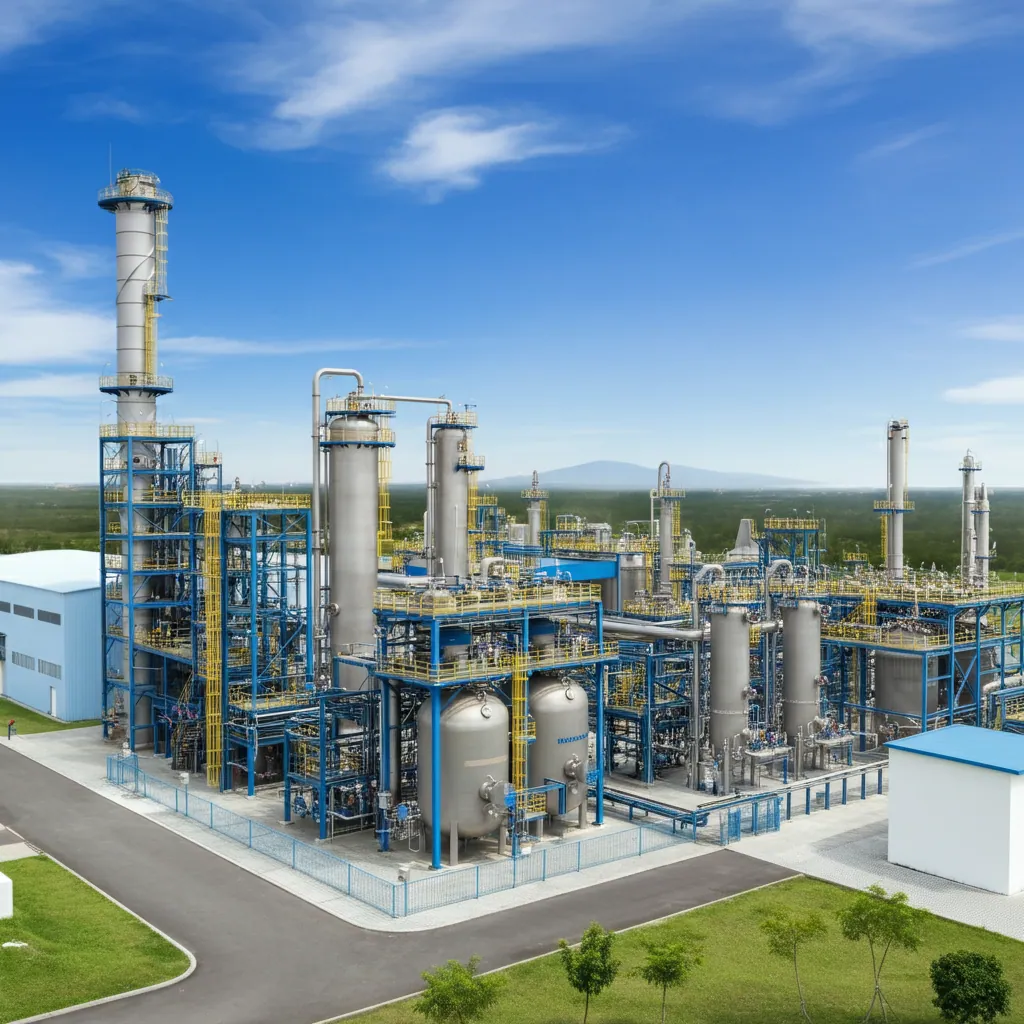1. India’s Untapped Chemical Opportunity
India’s specialty chemical industry represents a dynamic and lucrative sunrise sector, characterised by high growth potential and strategic importance to global supply chains. Supported by rising domestic demand and global recognition, this segment holds immense promise for startups and MSMEs looking to tap into high-margin businesses.
A business friendly environment, underpinned by supportive government policies and robust infrastructure, is fostering growth in the specialty chemicals sector and attracting significant investments.
Despite being the sixth-largest producer of chemicals globally, India continues to import a significant portion of specialty chemicals, highlighting a massive gap in local production. MSMEs are uniquely positioned to bridge this gap due to their agility and innovative capabilities, enabling them to seize opportunities in niche markets. Strong demand and rising demand from both domestic and international markets are driving expansion, with both domestic and international companies increasing their presence in India to capitalize on these favorable conditions. With strong policy backing from the Indian government and increasing global reliance on Indian suppliers, this sector has become a goldmine waiting to be explored.
India’s specialty chemical industry is also playing an increasing role in global exports, strengthening its position in the international market.

2. What Are Specialty Chemicals?
Specialty chemicals are value-added products tailored for specific industries and applications, distinguishing them from high-volume, low-value commodity chemicals. These chemicals are critical ingredients in industries like pharmaceuticals, textiles, and electronics.
Key segments include:
- Pharma Intermediates: Input chemicals for Active Pharmaceutical Ingredients (APIs).
- Textile Chemicals: Dyes, binders, and eco-friendly auxiliaries.
- Electronics-Grade Chemicals: High-purity solvents, etchants, and photoresists.
- Agrochemicals: Raw materials for agriculture, supporting crop protection and yield improvement.
- Petrochemicals: Foundational inputs for various industries, driving sector expansion and economic growth.
When planning a specialty chemicals business, it is crucial to identify the specific chemicals in demand through thorough market research, understanding target audiences, and analyzing supplier proximity to optimize manufacturing.
Unlike commodities, specialty chemicals cater to a low-volume, high-margin business model, making them an attractive proposition for MSMEs focused on profitability and innovation. Effective packaging also plays a vital role in enhancing product appeal and brand differentiation in the specialty chemicals market.
3. Market Scope & Demand Drivers
The specialty chemicals market in India is valued at approximately USD 40 billion and is projected to grow at a CAGR of 11-12% over the next five years. Globally, the industry is estimated to exceed USD 1 trillion by 2025. Key demand drivers include:
- Pharmaceuticals and Healthcare: Rising production of APIs and drug formulations.
- Electronics Manufacturing: Expansion of semiconductor and electronics facilities under the “China+1” strategy.
- Textile Sector Growth: Demand for sustainable and high-performance chemicals.
- Policy Push: Initiatives like the Atmanirbhar Bharat and Production-Linked Incentive (PLI) schemes aim to boost domestic specialty chemical production.
With large-scale global buyers diversifying sourcing and turning to Indian manufacturers, the growth runway for MSMEs in specialty chemicals is significant.
4. High-Margin Niches Worth Exploring
Specialty chemical production encompasses several lucrative verticals. Entrepreneurs can explore diverse niches such as:
Pharma Intermediates & APIs
Used in the bulk manufacturing of drugs, this space remains a key priority under India’s PLI schemes. The ongoing push for indigenous healthcare production bolsters this segment.
Textile Chemicals & Dyes
The demand for environment-friendly dyes and auxiliaries is rising as global brands pursue sustainability.
Electronics-Grade Chemicals
Semiconductor manufacturing is rapidly scaling, driving the need for photoresists, etchants, and high-purity cleaning formulations. Startups targeting this segment benefit from rising investments in electronics infrastructure.
5. Investment & Infrastructure Requirements
Setting up a specialty chemical unit involves investments in land, machinery, utilities, and compliance systems. Approximate investments can range:
- Small-scale Units: ₹1 crore – ₹3 crore
- Medium-scale Units: ₹5 crore – ₹10 crore
- Large-scale Units: ₹20 crore+
It is important to follow a structured process for setting up a specialty chemicals business, starting from legal registration to operational setup. As part of this process, businesses must obtain all necessary approvals and clearances, such as pollution control clearance and GST registration, to ensure legal compliance.
Critical infrastructure includes:
- Robust infrastructure with reliable transportation and logistics networks, utility setups for water, power, and effluent management.
- Safety systems and Zero Liquid Discharge (ZLD) compliance.
- R&D laboratories for formulation development.
Professional services, including legal, compliance, bookkeeping, and advisory services, are available to assist MSMEs in establishing their operations and ensuring regulatory adherence.
Alternatively, MSMEs can explore a contract-formulation strategy, partnering with established players for R&D and custom manufacturing.
6. Financing Your Chemical Venture: MSME-Friendly Options
Securing the right financing is a cornerstone for launching and scaling a specialty chemicals business in India. The government has rolled out several incentives and schemes tailored for MSMEs in the chemical sector, making it easier for entrepreneurs to access capital and reduce initial costs. One of the most impactful initiatives is the Production Linked Incentive (PLI) scheme, which directly rewards increased production of specialty chemicals and supports the growth of the domestic chemical industry.
To tap into these benefits, it’s essential to register your business as a Private Limited Company or a Sole Proprietorship, depending on your operational needs and long-term vision. Proper company registration not only opens doors to government-backed loans and subsidies but also builds credibility with investors and suppliers.
Explore opportunities for funding through a mix of sources:
- Government Schemes: Avail collateral-free loans, capital subsidies, and market development assistance by registering under MSME schemes.
- Venture Capital & Private Investors: Attract investment by showcasing a robust business plan and a focus on quality control and compliance with industry standards.
- Crowdfunding & Angel Investors: Leverage alternative funding platforms to raise initial capital, especially for innovative specialty chemicals projects.
Remember, compliance with environmental regulations, obtaining pollution control clearance, and securing a factory license are prerequisites for most funding avenues. By focusing on quality control, adhering to industry standards, and ensuring all necessary permits are in place, you can build a strong foundation for a successful business in the chemical manufacturing sector.
6. Licenses & Regulatory Compliances
A specialty chemical manufacturing unit requires multiple regulatory approvals:
- Pollution Control Board Clearance (CPCB/SPCB)
- Factory License for operational compliance
- Hazardous Chemicals Handling Permit under MSIHC Rules
- ISO Certifications for quality (ISO 9001) and environmental standards (ISO 14001)
- Drug License for pharma intermediates (if applicable)
Compliance with safety protocols like ZLD norms and fire safety is non-negotiable.
7. Raw Materials and Sourcing Strategy
Sourcing consistent and high-quality raw materials is integral to success. These materials can be procured through:
- Domestic suppliers for bulk chemicals.
- B2B platforms like IndiaMART or direct tie-ups for imports.
- Vendor audits to maintain quality assurance.
8. Technology & Machinery
Specialty chemicals manufacturing requires technologically advanced machinery, including:
- Reactors and distillation columns for chemical synthesis.
- ETP (Effluent Treatment Plants) to manage waste.
- Automation tools for precision in batch processing.
Indian-made machinery offers cost benefits, whereas imported equipment may provide advanced functionalities but at a premium price.
10. Building Your Team: Human Resources & Training for Chemical MSMEs
A skilled and well-trained workforce is the backbone of any successful chemical manufacturing business. In the Indian chemical industry, assembling a team with expertise in chemical engineering, quality control, and waste management is crucial for maintaining high standards and ensuring compliance with environmental regulations.
Start by recruiting professionals who have a solid background in the chemical sector—whether fresh graduates from top institutions or experienced industry veterans. Invest in regular training programs that cover the latest industry standards, safety protocols, and regulatory requirements. This not only helps your team stay updated but also fosters a culture of safety and continuous improvement.
On-the-job training, workshops, and certifications in areas like quality control and waste management can further enhance your team’s capabilities. By prioritizing human resource development and ongoing training, you ensure compliance with regulations, boost operational efficiency, and create a workplace that attracts and retains top talent. Ultimately, investing in your people is investing in the long-term success and reputation of your chemical business.
9. Government Incentives & Subsidies

MSMEs can unlock substantial financial benefits through government support, including:
- MSME Registration: Yielding access to collateral-free loans and market development assistance.
- CLCS-TUS Scheme: Subsidies on capital investment.
- PLI Schemes: 20-30% financial incentives, particularly for segments like bulk drugs.
States like Gujarat and Maharashtra also provide additional benefits, including custom-duty exemptions and VAT subsidies.
10. Export Potential & International Compliance
Indian MSMEs are well-poised to penetrate highly lucrative export markets, including the US, EU, and Japan. Key considerations include:
- REACH Compliance: Mandatory for exporting to European markets.
- Export Incentives: Leverage DGFT schemes, such as RoDTEP and MEIS, to boost market presence abroad.
11. Startup India & PLI Benefits
Startups can utilise Start-Up India’s tax exemptions and funding support to scale operations. The inclusion of specialty chemicals under PLI schemes further enhances profitability by offsetting input costs through subsidies.
Example Setup Approach:
- Build a mid-scale pharma intermediate plant with up to 30% capital subsidy under PLI.
12. Business Model Options for Entrepreneurs
Own Manufacturing
Produce and distribute under your brand.
Contract Manufacturing
Collaborate with large corporations for steady business.
Niche R&D
Focus on high-value, research-driven specialty segments for long-term gains.
15. Marketing & Sales Strategies for Specialty Chemical MSMEs
To thrive in the specialty chemicals sector, MSMEs must adopt innovative marketing and sales strategies that set them apart in a competitive market. Begin by clearly identifying your target customers—whether they are in pharmaceuticals, textiles, electronics, or other industries—and craft a compelling value proposition that highlights the unique benefits and quality of your specialty chemicals.
Leverage digital marketing tools such as social media, email campaigns, and a professional website to reach a wider audience and generate leads. Participating in industry events, trade shows, and B2B expos can help you showcase your products, build relationships, and gain valuable market insights.
Emphasize your commitment to quality, safety, and compliance with industry standards in all your marketing materials. This builds trust with customers and positions your business as a reliable partner in the specialty chemicals sector. By focusing on customer needs, maintaining high standards, and actively promoting your offerings, you can establish a strong presence and drive growth in the specialty chemicals market.
16. Operations & Maintenance: Ensuring Efficiency and Longevity
Efficient operations and proactive maintenance are essential for the long-term success of your chemical factory. Implementing a robust quality control system ensures that every stage of production meets industry standards and regulatory requirements, minimizing errors and maintaining product consistency.
Regular maintenance of machinery and equipment is vital to prevent costly breakdowns and ensure uninterrupted production. Investing in automation and advanced technology can streamline processes, reduce manual intervention, and enhance overall productivity. Additionally, a comprehensive waste management system is crucial for minimizing environmental impact and ensuring compliance with environmental regulations.
Don’t overlook the importance of fire safety regulations and obtaining all necessary permits, such as your factory license, to operate legally and safely. By focusing on these key steps—quality control, equipment maintenance, waste management, and regulatory compliance—you can create a sustainable, efficient, and reputable business in the Indian chemical industry. This commitment to operational excellence not only reduces costs but also strengthens your position as a responsible leader in the chemical sector.
13. Risk Mitigation & Safety
Ensuring optimal safety reduces long-term operational risks:
- Establish robust pollution and waste treatment systems.
- Train employees on industrial handling and fire safety protocols.
- Adopt third-party insurance to minimise liability.
14. Success Stories: Indian MSMEs Doing It Right
Notable MSME pioneers include:
- Navin Fluorine International: Leveraging innovation to dominate the fluorochemical segment.
- Aarti Industries: A leader in exporting specialty chemicals globally.
- Rossari Biotech: A success story in textile and hygiene chemicals, riding on export demand.
15. India’s Goldmine Awaits Brave Innovators
The specialty chemical market offers unparalleled opportunity. With structured planning, targeted investments, and policy support, MSMEs can unlock immense potential. Begin your chemical venture with expert guidance today. Start small, scale smart, and fuel India’s path to becoming a global specialty chemical hub.
